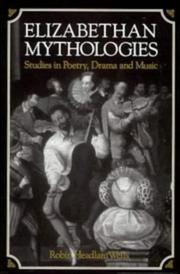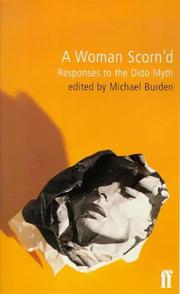| Listing 1 - 6 of 6 |
Sort by
|
Book
ISBN: 9781783273713 1783273712 9781787444409 1787444406 Year: 2019 Publisher: Martlesham : The Boydell Press,
Abstract | Keywords | Export | Availability | Bookmark
 Loading...
Loading...Choose an application
- Reference Manager
- EndNote
- RefWorks (Direct export to RefWorks)
"Myths and stories offer a window onto medieval and early modern musical culture. Far from merely offering material for musical settings, authoritative tales from classical mythology, ancient history and the Bible were treated as foundations for musical knowledge. Such myths were cited in support of arguments about the uses, effects, morality and preferred styles of music in sources as diverse as theoretical treatises, defences or critiques of music, art, sermons, educational literature and books of moral conduct. Newly written literary stories too were believed capable of moral instruction and influence, and were a medium through which ideas about music could be both explored and transmitted. How authors interpreted and weaved together these traditional stories, or created their own, reveals much about changing attitudes across the period. Looking beyond the well-known figure of Orpheus, this collection explores the myriad stories that shaped not only musical thought, but also its styles, techniques and practices. The essays show that music itself performed and created knowledge in ways parallel to myth, and worked in tandem with old and new tales to construct social, political and philosophical views. This relationship was not static, however; as the Enlightenment dawned, the once authoritative gods became comic characters and myth became a medium for ridicule. Overall, the book provides a foundation for exploring myth and story throughout medieval and early modern culture, and facilitating further study into the Enlightenment and beyond."-- Page [4] of cover.
Music --- Music and mythology --- History --- Mythology --- Myth --- Civilization, Medieval --- Medieval civilization --- Middle Ages --- Civilization --- Chivalry --- Renaissance --- Demythologization --- God --- Gods --- Religion --- Myths --- Legends --- Religions --- Folklore --- Mythology and music --- History and criticism
Book
ISBN: 1009028677 1316563065 110714874X 1009028391 Year: 2021 Publisher: Cambridge, England : Cambridge University Press,
Abstract | Keywords | Export | Availability | Bookmark
 Loading...
Loading...Choose an application
- Reference Manager
- EndNote
- RefWorks (Direct export to RefWorks)
Where does music come from? What kind of agency does a song have? What is at the root of musical pleasure? Can music die? These are some of the questions the Greeks and the Romans asked about music, song, and the soundscape within which they lived, and that this book examines. Focusing on mythical narratives of metamorphosis, it investigates the aesthetic and ontological questions raised by fantastic stories of musical origins. Each chapter opens with an ancient text devoted to a musical metamorphosis (of a girl into a bird, a nymph into an echo, men into cicadas, etc.) and reads that text as a meditation on an aesthetic and ontological question, in dialogue with 'contemporary' debates - contemporary with debates in the Greco-Roman culture that gave rise to the story, and with modern debates in the posthumanities about what it means to be a human animal enmeshed in a musicking environment.
Music, Greek and Roman --- Music and mythology. --- Metamorphosis --- Metamorphosis (in religion, folk-lore, etc.) --- Mythology and music --- Mythology --- Greek music --- Music, Greek (Ancient) --- Music, Roman --- Roman music --- Music --- History and criticism. --- Philosophy and aesthetics. --- Mythology.
Book
ISBN: 1787444406 Year: 2019 Publisher: Suffolk : Boydell & Brewer,
Abstract | Keywords | Export | Availability | Bookmark
 Loading...
Loading...Choose an application
- Reference Manager
- EndNote
- RefWorks (Direct export to RefWorks)
Myths and stories offer a window onto medieval and early modern musical culture. Far from merely offering material for musical settings, authoritative tales from classical mythology, ancient history and the Bible were treated as foundations for musical knowledge. Such myths were cited in support of arguments about the uses, effects, morality, and preferred styles of music in sources as diverse as theoretical treatises, defences or critiques of music, art, sermons, educational literature, and books of moral conduct. Newly written literary stories too were believed capable of moral instruction and influence, and were a medium through which ideas about music could be both explored and transmitted. How authors interpreted and weaved together these traditional stories, or created their own, reveals much about changing attitudes across the period. Looking beyond the well-known figure of Orpheus, this collection explores the myriad stories that shaped not only musical thought, but also its styles, techniques, and practices. It shows that music itself performed and created knowledge in ways parallels to myth, and worked in tandem with old and new tales to construct social, political, and philosophical views. This relationship was not static, however; as the Enlightenment dawned, the once authoritative gods became comic characters and myth became a medium for ridicule. Overall, it provides a foundation for exploring myth and story throughout medieval and early modern culture, and facilitating further study into the Enlightenment and beyond. Contributors: Jamie Apgar, Katie Bank, Samantha Bassler, Katherine Butler, Elina G. Hamilton, Sigrid Harris, Ljubica Ilic, Erica Levenson, John MacInnis, Patrick McMahon, Aurora Faye Martinez, Jacomien Prins, Tim Shephard, Jason Stoessel, Férdia J. Stone-Davis, Amanda Eubanks Winkler.
Music and mythology --- Music --- Mythology. --- Myth. --- Civilization, Medieval. --- Mythology and music --- Mythology --- Civilization, Medieval --- Medieval civilization --- Middle Ages --- Civilization --- Chivalry --- Renaissance --- Demythologization --- God --- Gods --- Religion --- Myths --- Legends --- Religions --- Folklore --- Myth --- History --- History and criticism. --- Art. --- Classical Mythology. --- Early Modern. --- Educational Literature. --- Enlightenment. --- Medieval. --- Moral Conduct. --- Music. --- Musical Knowledge. --- Sermons. --- Story.

ISBN: 9027979189 3110808757 9783110808759 9789027979186 Year: 1979 Volume: 51 Publisher: The Hague : Mouton,
Abstract | Keywords | Export | Availability | Bookmark
 Loading...
Loading...Choose an application
- Reference Manager
- EndNote
- RefWorks (Direct export to RefWorks)
No detailed description available for "Myth and Music".
Music and mythology. --- Music --- Philosophy and aesthetics. --- Semiotics. --- Semiotics --- Wagner, Richard --- Stravinski, Igor --- Sibelius, Jean --- -Music --- -Music and mythology --- Mythology and music --- Mythology --- Art music --- Art music, Western --- Classical music --- Musical compositions --- Musical works --- Serious music --- Western art music --- Western music (Western countries) --- Philosophy and aesthetics --- Hermeneutics (Music) --- Musical aesthetics --- Aesthetics --- Philosophy --- Music and mythology --- Music theory --- Sémiotique et musique --- Sémiotique et musique. --- Sémiotique et musique.

ISBN: 0521433851 Year: 1994 Publisher: (Cambridge) Cambridge University Press
Abstract | Keywords | Export | Availability | Bookmark
 Loading...
Loading...Choose an application
- Reference Manager
- EndNote
- RefWorks (Direct export to RefWorks)
Greek mythology in literature --- Griekse mythologie in de literatuur --- Music and mythology --- Musique et mythologie --- Muziek en mythologie --- Mythologie [Griekse ] in de literatuur --- Mythologie en muziek --- Mythologie et musique --- Mythologie grecque dans la littérature --- Mythology [Greek ] in literature --- Mythology and music --- Symboliek in de literatuur --- Symboliek in muziek --- Symbolism in literature --- Symbolism in music --- Symbolisme dans la littérature --- Symbolisme en musique --- English literature --- Music and literature --- Music and mythology. --- Music --- Mythology, Greek, in literature. --- Symbolism in literature. --- Symbolism in music. --- Greek influences. --- History and criticism. --- History --- Greek influences --- Early modern, 1500-1700 --- History and criticism --- England --- 16th century --- Music and literature - England - History - 16th century. --- Music - England - 16th century - History and criticism.

ISBN: 0571176992 Year: 1998 Publisher: London Faber and Faber
Abstract | Keywords | Export | Availability | Bookmark
 Loading...
Loading...Choose an application
- Reference Manager
- EndNote
- RefWorks (Direct export to RefWorks)
Music and mythology --- Musique et mythologie --- Muziek en mythologie --- Mythologie en muziek --- Mythologie et musique --- Mythology and music --- Dido (Legendary character) --- -Dido (Legendary character) in literature --- Drama --- -Opera --- -Comic opera --- Lyric drama --- Opera --- Opera, Comic --- Operas --- Dramatic music --- Singspiel --- Drama, Modern --- Plays --- Stage --- Literature --- Acting --- Dialogue --- Dido, Queen of Carthage (Legendary character) --- Elissa (Legendary character) --- Legends --- Art --- Themes, motives --- History and criticism --- Philosophy --- Carthage (Extinct city) --- -Carthage (Ancient city) --- Carthago (Extinct city) --- Kart Hadasht (Extinct city) --- Qarțājannah (Extinct city) --- Tunisia --- In literature --- Antiquities --- -Art --- -In literature --- -Dido, Queen of Carthage (Legendary character) --- Comic opera --- Dido (Legendary character) in literature --- Carthage (Ancient city) --- In literature. --- Dramas --- Dramatic works --- Playscripts
| Listing 1 - 6 of 6 |
Sort by
|

 Search
Search Feedback
Feedback About UniCat
About UniCat  Help
Help News
News